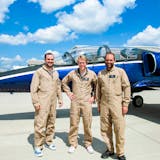I applaud the Walz-Flanagan team for assembling a diverse group of leaders of administrative departments and offices. Minnesota is in good hands with this group of highly accomplished experts who all bring different perspectives and skills to their work on our behalf.
The Walz-Flanagan transition to leadership provoked me to think about the role scientists and engineers play in forming public policy. After looking at the list of the 29-member "One Minnesota" advisory team, it seems there were no scientists or engineers. Similarly, now that nearly all the cabinet-level and department administrators have been announced, it is clear there is a lack of scientists or engineers in the governor's cabinet and among heads of administrative departments.
While a few members have undergraduate science degrees, the only strong science background is that of Sarah Strommen, the new head of the Department of Natural Resources. We presume that the director of information technology will have a background in information technology or a computing field. Of the 21 or so appointees, there is only one scientist.
The perspectives brought to the table by scientists and engineers are important for envisioning, discussing and setting public policy. Science provides an important vantage point from which to assess policy. While the scientific perspective is no more valid than perspectives of those trained in law, philosophy, public policy or any other field, it is also no less valid.
The office of the governor and lieutenant governor does not write laws, but the office can set the tone and help with envisioning policy. The governor does propose a budget, which might benefit from perspective on matters scientific. At the least, governors will inevitably need to make decisions about policies and bills that are presented to them for signature into law. The executive branch should have a resource, an expert on staff, to whom the governor can turn for advice and insights on matters related to science and technology.
The state of Minnesota needs an Office of Science and Engineering Technology Policy to inform our leaders on critical matters related to science and engineering technology. Perhaps this office should stand alone as a department or perhaps the position would simply be an adviser to the governor. As an academic, I am keenly aware of administrative excess, and I hesitate to call for "more government." However, I find it problematic that a state built on the technologies of mining, milling, agriculture, medical devices and computing doesn't have a stand-alone, cabinet-level science adviser.
To avoid stepping on the toes of existing departments, the new office's charge could be written narrowly enough so that it doesn't set specific policies but rather serves in an advisory role. It is easy to imagine that the DNR, the MPCA and the Employment and Economic Development, Education and Commerce departments could benefit from an office of Science and Engineering Policy.
Now, more than at any time in the recent history of our state, I believe we need the scientific perspective to inform our decisions related to big policy issues that intersect with science — these issues impact education, commerce, economic development, the environment and health. Growing up in the 1970s and '80s in Minnesota, we were the "education state" and technology companies loomed large. Today, although we have a burgeoning medical/bio-technology sector, it just doesn't seem to carry the same weight that the tech goliaths of our past did.


